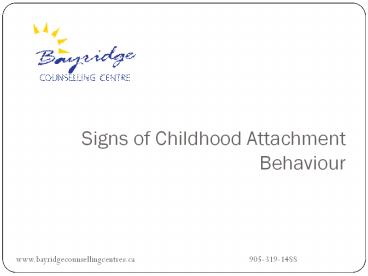Signs of Childhood Attachment Behaviour.pptx - PowerPoint PPT Presentation
Title:
Signs of Childhood Attachment Behaviour.pptx
Description:
Signs of Childhood Attachment Behaviour.pptx – PowerPoint PPT presentation
Number of Views:48
Title: Signs of Childhood Attachment Behaviour.pptx
1
Signs of Childhood Attachment Behaviour
2
From the time we are infants, we develop
attachments to our parents, siblings,
grandparents, and other children and adults. For
most children, attachment behaviours develop
normally where they feel safe and secure in their
relationships.
3
As a result, they are not afraid to form new
friendships, express emotions, and build
meaningful connections with others.
4
For other children, they have a much more
difficult time developing such relationships due
to attachment disorders. There are several
different classifications and types of attachment
disorders,
5
largely based upon early childhood development
and their initial relationships with their
parents, brothers and sisters, and other close
family members.
6
Children with these disorders find it difficult
to express their emotions and connect with
others. They develop a lack of trust in others,
which leads to self-doubt and insecurities.
7
They could exhibit anger or behave in such a
manner where they are dictating control
regardless of whether the parents give in or not.
8
In many cases, the children with attachment
problems feel alone and isolated, and believe no
one can be depended upon.
9
One of the more common types is called reactive
attachment disorder. There can be several
different underlying triggers, such as
10
- Moving from one foster home to another.
- Being bounced around from one parent or relative
to the next. - Experiencing emotional or physical abuse.
11
Some of the typical early warning symptoms and
signs to watch for in children that develop
reactive attachment disorder includes
12
1. Developmental Issues The level of their
development is behind other children their own
age.
13
2. Anger Issues From throwing temper tantrums
when they do not get their own way to acting in
passive-aggressive manners, anger can be
expressed both directly and indirectly.
14
3. Avoids Being Touched Touch and feelings
associated with physical forms of affection, like
hugs, are perceived by the child as a threat.
They will pull away, flinch, say they feel pain,
or even laugh when touched affectionately.
15
4. Underdeveloped Conscience The child with
reactive attachment disorder may not display
signs of remorse, guilt, or regret after being
disciplined for bad behaviour.
16
5. Control Problems The child feels they must
remain in control and will behave in such manners
to maintain this control.
17
For instance, they might have a tantrum to sway
their parents to do what they want. They can also
act out and become defiant, argumentative, and
disobedient.
18
6. Problems Showing Affection Children with
this disorder find it difficult to show true
affection towards others.
19
In some cases, they may display few acts of
affection towards those closest to them, while
conversely, show inappropriate forms of affection
towards complete strangers.
20
As the child ages, the symptoms will continue to
become more pronounced and evident. In addition,
if not treated with help from an experienced
family and child counsellor, other patterns of
either disinhibited or inhibited symptoms often
develop.
21
To learn more about childhood attachment
disorders or if your child is displaying symptoms
that might indicate a problem, please feel free
to contact Bayridge Counselling Centre at
905-319-1488 today!
22
We are here to help and have counsellors with
expertise in assisting children, teens and
families. Source- http//www.bayridgecounsell
ingcentres.ca/signs-of-childhood-attachment-behavi
our/































